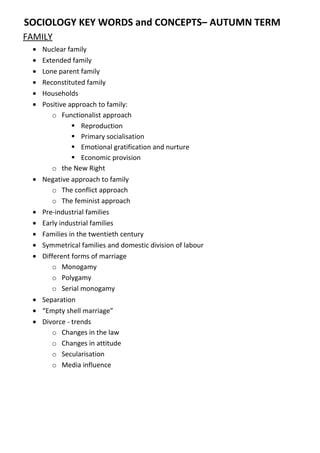
SociologyExchange.co.uk Shared Resource
- 1. SOCIOLOGY KEY WORDS and CONCEPTS– AUTUMN TERM FAMILY • Nuclear family • Extended family • Lone parent family • Reconstituted family • Households • Positive approach to family: o Functionalist approach Reproduction Primary socialisation Emotional gratification and nurture Economic provision o the New Right • Negative approach to family o The conflict approach o The feminist approach • Pre-industrial families • Early industrial families • Families in the twentieth century • Symmetrical families and domestic division of labour • Different forms of marriage o Monogamy o Polygamy o Serial monogamy • Separation • “Empty shell marriage” • Divorce - trends o Changes in the law o Changes in attitude o Secularisation o Media influence
- 2. • Changing trends in marriage o People are getting married later o Increase in cohabitation o Decline in marriage rate o Increase in births outside marriage • Trend in families and households today o Apparent decline of nuclear family o Increase of lone-parent families o Increase of reconstituted families o Decline in fertility rate o Increase in abortion increase in dual-worker families EDUCATION • Functionalist view o Teaching skills and knowledge o Selective role: meritocratic o Socialisation role: teaching acceptance of rules and authority (agent of social control – formal and informal) • Marxist view o Reinforcing the class system o Selective role: no equal opportunities o Socialisation role: reflects social control in the wider society • The political role • Official curriculum: formal learning • Hidden curriculum: informal learning o Hierarchy o Competition o Social control o Gender role allocation o Lack of satisfaction • The education system in Britain o Before 1870 o The 1870 Education Act o The 1944 Butler Education Act The tri-partite system o 1965: the start of the comprehensive system Why are comprehensives a good idea? What are the problems with the comprehensive system?
- 3. Do comprehensives break down class barriers? • How is the education system organised in Britain? o Pre-school education o Primary education o Secondary education o further and higher education • Independent sector: private schools and public schools o Low teacher-pupil ratio o Better resources and facilities o Academic culture (good results) o High parental input (fees, expectations, support) o Full immersion of staff and students in school life • State schools o Free o More socially mixed o May provide a route of upward social mobility o No need to travel far for pupils • Educational achievement o Gender and single sex schools o Why are boys achieving less than girls? o Ethnicity o Social class o Naturenurture debate o Parents’ expectation o Material deprivation o Cultural deprivation o School and teachers’ judgements and expectations Labelling Self-fulfilling prophecy Halo effect o Streaming and sets WORK • What is work? • Formal economy • Informal economy o Hidden o Domestic
- 4. o Communal • Is housework work? • Why do people work in paid employment? o Intrinsic satisfaction o Economic motive o Social contacts o Status and identity • Different types of employment o Primary sector o Secondary sector o Tertiary sector (service work) • How work affects non-working life o Life chances o Standard of life o Family life o Health • Mechanisation • Automation • Deskilling and reskilling • Alienation o Lack of power o Lack of meaning o Isolation o Lack of fulfilment • Women at work o Sex discrimination o Vertical segregation o Glass ceiling o Invisible walls o Triple shift • Ethnicity and work o Racial discrimination • New work patterns o Flexi work o Short term work o McJobs • Retirement • Trade unions • Leisure